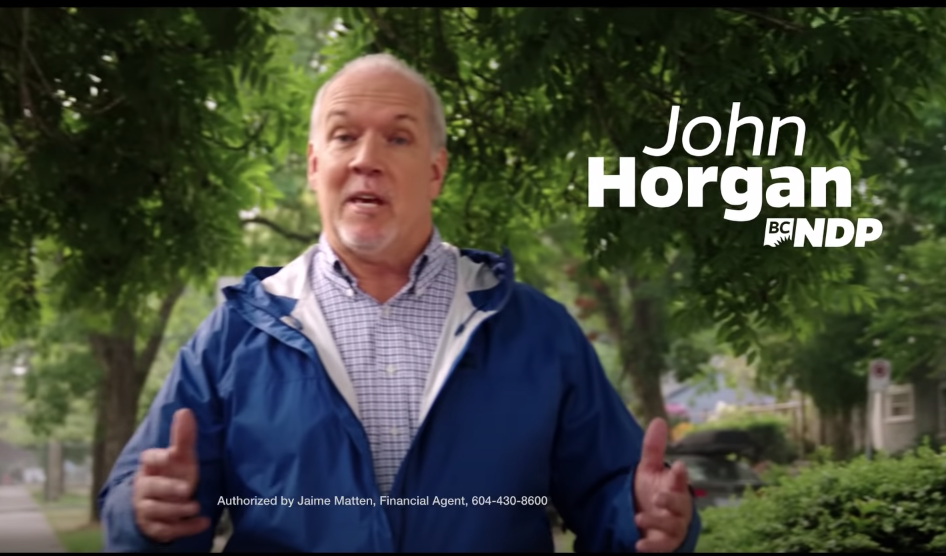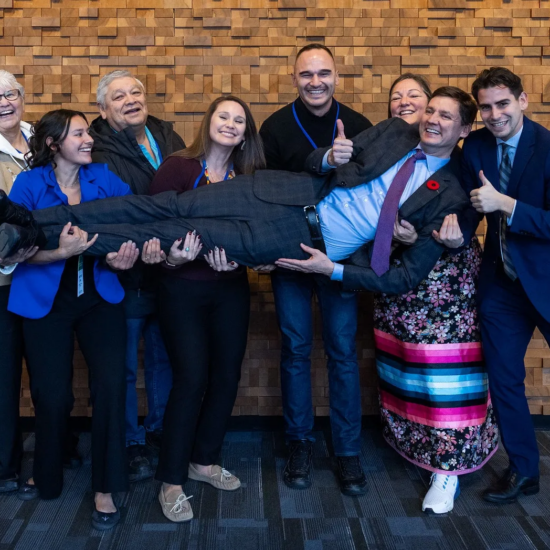
Bob Mackin
A lawyer who fought the BC Liberals for wasting millions of dollars said he is “sad and frustrated” that the NDP government is now doing the same.

Scenes from some B.C. government ads in 2021. So far.
An investigation by theBreaker.news has found nearly $14.7 million has been budgeted for British Columbia government ministry and Crown corporation ad campaigns for the first three months of 2021. Almost all of it is earmarked for the run-up to the March 31 fiscal year-end.
“Think of the money that could be used for teachers, or what have you, and here we are,” said Paul Doroshenko. “This is sure upsetting to hear this. Not surprising, huh? Doesn’t matter who the government is. The NDP is as bad as the Liberals.”
The NDP government budgeted $7.93 million through the Government Communications and Public Engagement department for seven advertising campaigns.
Two of the campaigns are related to public health emergencies, the coronavirus pandemic and opioid overdoses. The rest are economic-themed.
Then there are $6.75 million in approved budgets for BC Hydro, B.C. Securities Commission, ICBC and WorkSafeBC campaigns. Only the latter is pandemic-themed.
Add it all up and that is $14.68 million of spending planned on TV, radio, outdoor and online ads just a few months after the government forecast a record $13.6 billion deficit and $88 billion debt.

B.C. Government ad budgets for Jan.-March 2021
The timing is strategic. Government ministries and agencies rush to spend what is left of their budgets in a phenomenon dubbed “March Madness.” Bureaucrats fear budget cuts in the coming year if they do not use all that was allotted in the April 1-March 31 cycle. However, any money left over is diverted to debt servicing.
“While the end of the pandemic is getting closer and we have reason to be hopeful, we still have a way to go,” said a statement from the Ministry of Finance, which is responsible for government communications. “And, the COVID-19 pandemic is happening at a time when we also continue to face the overdose crisis. It’s imperative that we use every tool available, including information campaigns, to ensure people have accurate information that helps to keep them safe, supports their families and that may even help save lives.”
Doroshenko called the statement “the standard B.S.”
Doroshenko and David Fai represented retired TransLink employee David Trapp in a B.C. Supreme Court lawsuit filed before the 2017 election. They accused the BC Liberal government of breaching its fiduciary duty to taxpayers by diverting funds from vital programs to its re-election campaign. A judge ruled in 2018 that a political party is an unincorporated association that cannot be sued.

B.C. Crown corp. ad budgets for Jan.-March 2021
Doroshenko said BC Liberal Premier Gordon Campbell lived up to promises to end non-essential government advertising during his first term in office from 2001 to 2005. But that changed after Campbell won two more elections.
“Think of how many other ways that money could be spent,” Doroshenko said. “It sure causes people to be cynical about politics, understandably so.”
Indeed, the actions of the NDP do not match the words of its leader when he was running for the top job.
In a November 2015 interview, John Horgan slammed the BC Liberals. Horgan told Business in Vancouver that then-Premier Christy Clark’s party was “padding the pockets of their political pals.” The BC Liberal government had just launched the first $5 million phase of the “Our Opportunity is Here” pre-election ad campaign. Executives behind two of the agencies had worked on Clark’s 2013 re-election.

Lawyer Doroshenko
“They spend countless dollars, time and energy withholding information that the public asks for, but when the public’s not looking for information they’ve got mountains of money to spend, to bury us in self-congratulatory promotion,” Horgan said at the time.
Fast forward to 2021 and the NDP is the one helping its political pals.
Three creative contracts for ministry campaigns went to Now Communications Group and four to Captus Advertising, the two highest-paid agencies on the party’s 2020 snap election campaign.
Now, formed by members of Mike Harcourt’s winning campaign team in 1991, billed $1.78 million for NDP campaign ads in 2020. Ethnic marketing specialist Captus billed the party almost $500,000, according to Elections BC filings.
Now also billed the government $970,063 for the 13 months ended April 30, 2020 and $90,930 to the Legislature for work on NDP caucus ads. Captus billed taxpayers $513,623 in 2019-20.
Normally, government procurement rules require open, public tendering for contracts $75,000 and up. Agencies that work for government ministries are chosen by GCPE from a preferred supplier’s list that was created by NDP-appointed political aides after the NDP came to power in 2017.

John Horgan (NDP)
When Selina Robinson succeeded Carole James as finance minister in late November, she received a transition binder that showed GCPE was already going over budget. The briefing materials said $41.06 million funding was available to GCPE in 2020-21, of which $14 million was related to advertising after budget increases.
In early March 2020, just before the pandemic was declared, GCPE received another $3.9 million for NDP priority ad campaigns about childcare, renting, healthcare and ICBC’s shift to no-fault insurance. It took until early April 2020 before the government had a co-ordinated pandemic ad campaign.
Support theBreaker.news for as low as $2 a month on Patreon. Find out how. Click here.











